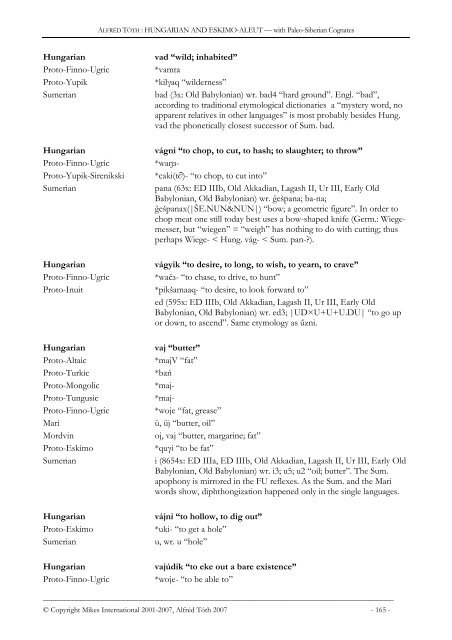Hungarian and Eskimo-Aleut
Hungarian and Eskimo-Aleut
Hungarian and Eskimo-Aleut
Create successful ePaper yourself
Turn your PDF publications into a flip-book with our unique Google optimized e-Paper software.
ALFRÉD TÓTH : HUNGARIAN AND ESKIMO-ALEUT — with Paleo-Siberian Cognates<br />
<strong>Hungarian</strong> vad “wild; inhabited”<br />
Proto-Finno-Ugric *vamta<br />
Proto-Yupik *kilγaq “wilderness”<br />
Sumerian bad (3x: Old Babylonian) wr. bad4 “hard ground”. Engl. “bad”,<br />
according to traditional etymological dictionaries a “mystery word, no<br />
apparent relatives in other languages” is most probably besides Hung.<br />
vad the phonetically closest successor of Sum. bad.<br />
<strong>Hungarian</strong> vágni “to chop, to cut, to hash; to slaughter; to throw”<br />
Proto-Finno-Ugric *waŋз-<br />
Proto-Yupik-Sirenikski *caki(t∂)- “to chop, to cut into”<br />
Sumerian pana (63x: ED IIIb, Old Akkadian, Lagash II, Ur III, Early Old<br />
Babylonian, Old Babylonian) wr. ĝešpana; ba-na;<br />
ĝešpanax(|ŠE.NUN&NUN|) “bow; a geometric figure”. In order to<br />
chop meat one still today best uses a bow-shaped knife (Germ.: Wiegemesser,<br />
but “wiegen” = “weigh” has nothing to do with cutting; thus<br />
perhaps Wiege- < Hung. vág- < Sum. pan-?).<br />
<strong>Hungarian</strong> vágyik “to desire, to long, to wish, to yearn, to crave”<br />
Proto-Finno-Ugric *wačз- “to chase, to drive, to hunt”<br />
Proto-Inuit *pikšamaaq- “to desire, to look forward to”<br />
ed (595x: ED IIIb, Old Akkadian, Lagash II, Ur III, Early Old<br />
Babylonian, Old Babylonian) wr. ed3; |UD×U+U+U.DU| “to go up<br />
or down, to ascend”. Same etymology as űzni.<br />
<strong>Hungarian</strong> vaj “butter”<br />
Proto-Altaic *majV “fat”<br />
Proto-Turkic *bań<br />
Proto-Mongolic *maj-<br />
Proto-Tungusic *maj-<br />
Proto-Finno-Ugric *woje “fat, grease”<br />
Mari ü, üj “butter, oil”<br />
Mordvin oj, vaj “butter, margarine; fat”<br />
Proto-<strong>Eskimo</strong> *quγi “to be fat”<br />
Sumerian i (8654x: ED IIIa, ED IIIb, Old Akkadian, Lagash II, Ur III, Early Old<br />
Babylonian, Old Babylonian) wr. i3; u5; u2 “oil; butter”. The Sum.<br />
apophony is mirrored in the FU reflexes. As the Sum. <strong>and</strong> the Mari<br />
words show, diphthongization happened only in the single languages.<br />
<strong>Hungarian</strong> vájni “to hollow, to dig out”<br />
Proto-<strong>Eskimo</strong> *uki- “to get a hole”<br />
Sumerian u, wr. u “hole”<br />
<strong>Hungarian</strong> vajúdik “to eke out a bare existence”<br />
Proto-Finno-Ugric *woje- “to be able to”<br />
___________________________________________________________________________________<br />
© Copyright Mikes International 2001-2007, Alfréd Tóth 2007 - 165 -

















